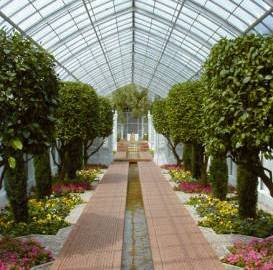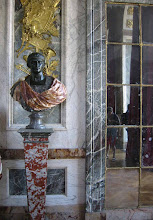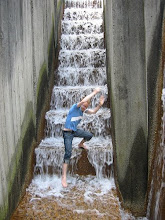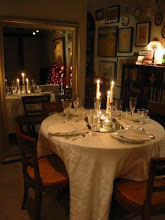 I first heard about the demise of Doris Duke's indoor greenhouse at Duke Farms in NJ from Aesthete's Lament a few weeks ago when he blogged about 'paradise lost' -since then it has been written up by many different areas in the press and getting a lot of negative attention.
I first heard about the demise of Doris Duke's indoor greenhouse at Duke Farms in NJ from Aesthete's Lament a few weeks ago when he blogged about 'paradise lost' -since then it has been written up by many different areas in the press and getting a lot of negative attention.  The trustees have decided to tear down these greenhouses which housed her international gardens that she worked long and hard on for years because they are energy guzzlers (supposedly) and they want to create a model of ecological conservation and sustainable environmental practices at Duke Farms. From what I understand -she left this farm in memorium to her father to be used as a sort of horticultural workshop in trust to a board of trustees. They are taking this mission and sort of changing how the farm started out. Is change a bad thing?
The trustees have decided to tear down these greenhouses which housed her international gardens that she worked long and hard on for years because they are energy guzzlers (supposedly) and they want to create a model of ecological conservation and sustainable environmental practices at Duke Farms. From what I understand -she left this farm in memorium to her father to be used as a sort of horticultural workshop in trust to a board of trustees. They are taking this mission and sort of changing how the farm started out. Is change a bad thing? I have very mixed feelings about this. While I am saddened by the loss of these fantastic gardens and their place in history, the creation of this new ecological conservatorium if done correctly will bring a lot of good to the field of ecology.
I have very mixed feelings about this. While I am saddened by the loss of these fantastic gardens and their place in history, the creation of this new ecological conservatorium if done correctly will bring a lot of good to the field of ecology. 
This brings out the larger question: where does history stop and research continue. Should places such as Duke Farms be frozen in time or become living / breathing / changing places. Museums after their foundation constantly expand their collections and put additions onto their spaces; occasionally even move the collection. What was Doris's intent upon creating Duke Farms? This is where the contention starts. It's a shame some sort of compromise can't be reached -such as keeping this building complex and turning the remaining acreage into the model of ecological conservation and sustainable environmental practices that the trustees invision.  In the future -will generations bemoan that the greenhouses were torn down, or will they find that what has replaced them more useful and important? That is hard to know. Back in the day when Pennsylvania Station in NYC was torn down (a big kick start for historic preservation) many people were opposed to the tearing down of that beautiful structure and still miss it to this day. The current Penn. Station is hideous and not even functional. Will the same fate be true for Duke Gardens? Or will whatever is coming next be so important that we will not even remember Doris's gardens....only time will tell.
In the future -will generations bemoan that the greenhouses were torn down, or will they find that what has replaced them more useful and important? That is hard to know. Back in the day when Pennsylvania Station in NYC was torn down (a big kick start for historic preservation) many people were opposed to the tearing down of that beautiful structure and still miss it to this day. The current Penn. Station is hideous and not even functional. Will the same fate be true for Duke Gardens? Or will whatever is coming next be so important that we will not even remember Doris's gardens....only time will tell.
 In the future -will generations bemoan that the greenhouses were torn down, or will they find that what has replaced them more useful and important? That is hard to know. Back in the day when Pennsylvania Station in NYC was torn down (a big kick start for historic preservation) many people were opposed to the tearing down of that beautiful structure and still miss it to this day. The current Penn. Station is hideous and not even functional. Will the same fate be true for Duke Gardens? Or will whatever is coming next be so important that we will not even remember Doris's gardens....only time will tell.
In the future -will generations bemoan that the greenhouses were torn down, or will they find that what has replaced them more useful and important? That is hard to know. Back in the day when Pennsylvania Station in NYC was torn down (a big kick start for historic preservation) many people were opposed to the tearing down of that beautiful structure and still miss it to this day. The current Penn. Station is hideous and not even functional. Will the same fate be true for Duke Gardens? Or will whatever is coming next be so important that we will not even remember Doris's gardens....only time will tell.










































.JPG)







































































5 comments:
I tend to be the one that would like to put a protective bubble over something of historical importance and of incredible beauty. I have seen some local homes of historical quality, being completly ruined by amatures with a bigger desire to have more space that to preserve the astetic beauty of the structure. I agree that there is a fine line between changing for the sake of change, and turning your backs the past, and changing with respect to its past.
Wouldnt having Solar PVCs and Solar water heater lessen the costs? Maybe its because of the size. Or ask Corporations co-sponsor or rent out certain areas for banquets, corporate workshops and the like? Did the board really exhaust all the options? Doris Duke was an very interesting woman to read about. Its a shame about the Duke Garden.
Smith College has a large greenhouse and allows vistors in its annual bulb show. So many colors and scents. At end of each winter, I get thinking about Smith's bulb show.
I think a sore point with these display gardens stems from the highly documented fact that they were Doris Duke's personal artistic effort, created partially in memory of her father. By all accounts she treasured them highly. It was her work of art left to us all. To destroy them, no matter what other good the trustees could do, does seem like very personal attack on the Doris Duke legacy.
I don't neccesarily disagree with you at all, Nosha. I just was wondering what the other side of the story was - every story has 2 sides
I'm 12 years late to this discussion, though remember it well--and am reminded of it, with irritation, every time I go to send images of this orangerie to friends / colleagues. I find it highly regrettable that the board of directors took this action and agree with so many of the points covered in the comments before mine. Nothing would be left of the other great gardens of Europe and North America if everyone took the same tact, because clearly, Versailles, for example, is not exactly eco-friendly, for starters. In America we seem to approach everything with such puritanical zeal: it's all or nothing. That the board of directors could not find it in themselves to work around Doris Duke's stunning work of art--truly, there was nothing like it anywhere else in the world (i.e. the night garden), is woeful. There was another way and they let their dogmatic ideals eclipse their reason and sense of duty to Doris Duke's legacy, itself.
Post a Comment